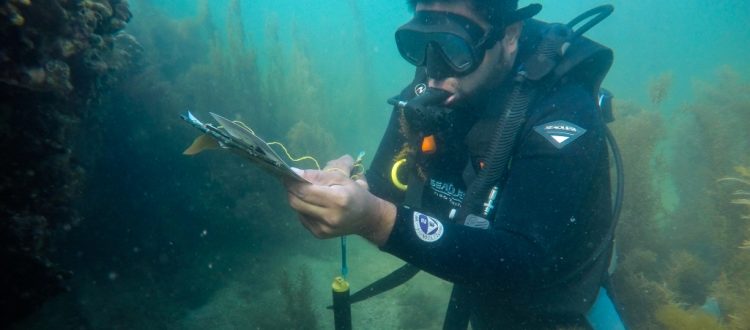Luck strikes twice: in waters off Gujarat
The sea has always enthralled me. Farther, deeper and bigger, it has always been a space so provocative, yet out of reach. In the decade I spent working for wildlife conservation, I was fortunate enough to traverse a wide range of landscapes. From remote mountains to massive rivers, from dripping evergreens to scorching barrenness, I have had a connect with all. For a very brief duration, I had even been fortunate to work and travel around snow scapes. But the sea, it has always eluded me. And that stint had to come to an end too and when it did, it was with characteristic immoderation!
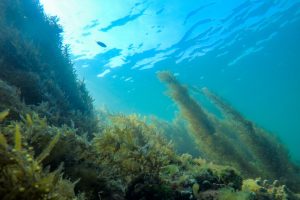
Mithapur-Reef, Photo Courtesy – Madhumay Mallik/WTI
The last week of 2021, a year that mostly revolved around the pandemic, was a complete change of perspective. On assignment to cover Wildlife Trust of India’s marine projects, I got the opportunity to travel to two of the most unique projects that our organization is running – the Coral Reef Recovery Project in Mithapur and the Whale Shark Conservation Project in Veraval.
Rainforests under sea
The Coral Reef Recovery Project started in 2008 with the creation of the one and only artificial reef system that is managed through private-public partnership. Anthropogenic threats to this unique ecosystem led to loss of individual species of corals and a variety of other life forms that the reefs supported. WTI started by transporting coral fragments from Lakshadweep and reintroduce them in artificial nurseries in Mithapur. With support from Tata Chemicals Limited and the Gujarat Forest Department, the team worked hard to bring about a change. Today, WTI is monitoring several such artificial reefs that have also helped bring back some unique marine life, including four species of sea horses!
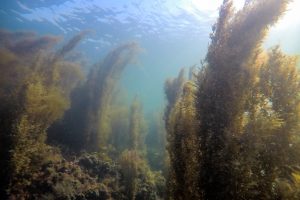
Underwater Forests in Mithapur Reef, Photo Courtesy – Madhumay Mallik/WTI
A leap into colours
The colours had already started changing as soon as the train passed Jamnagar, closing in on the coastal landscape. Back in Delhi, you will never see the sky so saturated and the water reflect the blues even more strikingly. Praveen, our project head at Mithapur, had come to receive me at Mithapur station and as we drove down to our field station, he shared more details about the project. The Mithapur Township is majorly dependent on two things – TCL’s Tata Salt, the product that becomes an inseparable part of most Indian households and fishing, the produce that sustains the remaining locals.
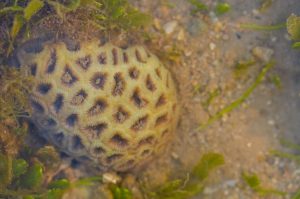
Moon Coral at Mithapur Reef, Photo Courtesy – Madhumay Mallik/WTI
What was special however that the locals have come to understood how important the coral reefs are a part of their livelihood. Acting as nurseries for baby fishes, it is these coral reefs that ensure that their livelihood is sustained. Consequently, they have now become a vital part of the conservation process, protecting both our marine life and their work, in the process.
My first ever scuba dive was scheduled for the next morning and my heart was already pumping more blood, even before the gear was being loaded onto Haujat’s bhai’s auto! Charan, a PADI certified Dive Master, and our field biologist, introduced me to the diving protocols meanwhile. Till that moment, I have known the blue depths from TV screens and have always wondered how it would be to dive in the middle of underwater forests and colourful shoals of fish! This dream was about to come true.
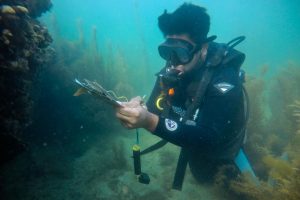
Reef Monitoring by Charan, Photo Courtesy – Madhumay Mallik/WTI
We loaded our oxygen tanks onto the boat and off we went. The farther we got from the shore, I could already see a new landscape – or seascape opening up. To my luck, the waters were crystal clear that day! Floating over the kelp canopies, Altaf, our field assistant helped me change into my gear. Shivani, a biologist working on Dugongs, who was accompanying us in the dive, was already in the waters, ready with her GoPro to record my first fall into the blue!
I was pretty comfortable in waters but never before had I encumbered myself with wet suits, weights and cylinders. It took me a while to adjust to my air tubes and the buoyancy, the later sometimes making you roll and panic for steadiness. But both Charan and Shivani were amazing teachers, patient with a newbie all the while. The first 15 minutes I spent inside was about getting comfortable and adapting but the moment I calmed myself down, it was a wonderland around me. Charan guided me along the artificial reefs and things that I had seen in reports so far were right in front of me, to touch, to stare and be mesmerised with. While he was recording the health data of the corals, I was already chasing Groupers and Sturgeons! I was merely 10 feet underwater but the calm and glistening seabed showcased beings that were no less than fiction.
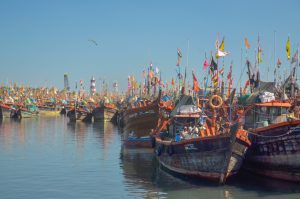
Veraval dockyard, Photo Courtesy – Madhumay Mallik/WTI
I got to explore the artificial reef for about an hour before my air pressure came down to 50 and it was time to return to surface. I wish I could have spent more time but I also considered myself lucky to have finally make a wish come true. For Charan, it was a daily job to be down there, gathering vital data on how our nurseries are faring. In the past decade, the project has been able to successfully create a sustainable habitat, giving high hopes for its conservation.
As we went back ashore, I promised myself to be back soon. I wrapped up my visit to Mithapur in the evening but the next stop had more surprises!
Veraval – home to Vhali
About 250 kilometres from Mithapur, I had reached Veraval even before the sun had come up. A port city, famous for its fishing industry, this is also the coast where India witnesses the most frequent sightings of the Whale Shark. Two decade ago, the Whale Shark, also the world’s largest fish, was frequently hunted down for its fins and liver oil. The year 1999 alone reported more than 600 landings of whale sharks and that was when conservationists began focussing on its protection.
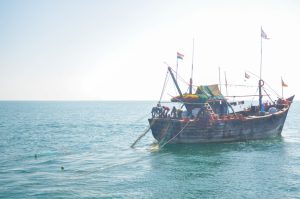
Trawler Fishing by Drag Net, Photo Courtesy – Madhumay Mallik/WTI
Wildlife Trust of India strategized and ran massive campaigns from 2004, with support from Morari Bapu, a popular spiritual leader in the country. People began to understand that this is a chosen coast where this massive fish came to raise its pups, just as in traditional Indian families, the daughters would come home with new born babies. Thus the whale shark, a fish that was hunted, turned into Vhali, or “the dear one”. A scheme was put in place by the Gujarat Forest Department that reimbursed fishermen for the loss of their nets when they released whale sharks entangled in drag nets. Together with Tata Chemicals Limited, WTI has been able to make the whale shark, a pride icon for the port city and the state and this win is among the most successful pride campaign run in the country.
Into the sea
As a member of the WTI communications team, I had been in constant touch with Farukhkha, our manager at the Gujarat Whale Shark Recovery Project. A sociologist by training and in spirit, there weren’t a single fisherman that didn’t know Farukhkha. Making friends and influencing the community, he lives his professional role in behaviour and action.
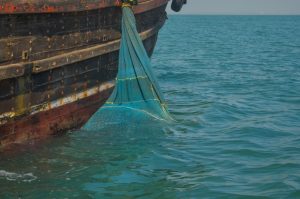
Whale Shark caught in trawler fishing net at Veraval Offshore, Photo Courtesy – Madhumay Mallik/WTI
First day in, we were already on the dockyards by sunrise, witnessed firsthand, how the port operated. It’s like the place never sleeps. Fishermen spend nights at length in the sea and when they are back, heir harvest goes through unloading, processing, auctioning and more. The kids here played with the surf, the women busy stitching nets together and the men, all hardy, had more seawater than blood in their veins. These were people who depended on the fish for their livelihood. Yet, they don’t think twice to let go of all their hard work when releasing their Vhali back into the waters. Farukhkha introduced me to several such fishermen who had stories from the deep blues, of the kind of creatures they have seen and their journeys on boats for weeks.
When luck struck twice!
This is a place where you get to see a true connect with people and their beliefs. And I think the sea was also bestowing all the luck on me. Around 11 am, Farukhkha got a call regarding a whale shark getting caught offshore, 3 nautical miles from the port. In the next half an hour, in coordination with the Forest Department, we had arranged a boat to give us a ride to the spot. Just like my ride to the coral reefs a day before, it was getting hard to control my excitement. Not many people get to see a whale shark and first day in, I was the chosen one!
We lost track of time till we got the first view of the polka dotted fish. The fishermen were already cutting off the nets and in the next five minutes, all eyes were on the massive blue fish. To the background claps and cheers of all the fish had soon glided its way back to the depths of the ocean, leaving a very gratified group on onlookers.
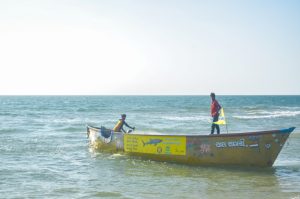
Whale Shark Boat Messaging, Photo Courtesy – Madhumay Mallik/WTI
For the next two days that I spent in Veraval, I learnt more on the closeness of the locals with their Vhali. Our campaigns had resulted in massive participation from all kinds of demographics, from corporate to local businesses, from school kids to teenagers, all part of the “Friends of Vhali” group, on a mission to protect their true blue daughter.
I come back with unique memories from Gujarat – of being the chosen one. Wildlife Conservation is more than spending a night in the jungle or seeing a tiger in a safari. It’s about people, it’s about beliefs, it’s about staying true to your purpose and it’s about empathy. I thank people like Charan, Praveen, Shivani, Altaf, Farukhkha and all the locals who stay grounded and who strive day and night to achieve a goal that not many fight for.
Well, that brought my 2021 to a close and all’s well that ends well!
____________________________________________
Madhumay Mallik is passionate about photography, travel and documenting his exploits, not necessarily in that order. He is an enthusiastic member of our Communications team, raring to travel and document stories from our field projects. With this experience, diving is now struck off his bucket list.

